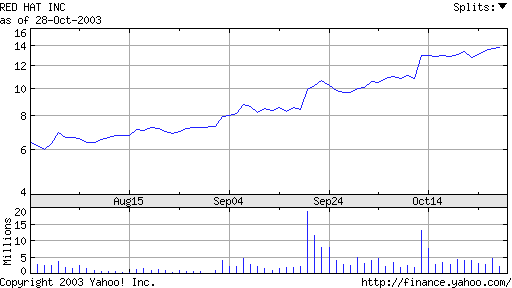Howard Strauss, “manager of technology strategy and outreach” at Princeton University, recently published a terrible article in Syllabus Magazine (“the only monthly publication that focuses on the role of technology in higher education”), entitled The FREE, 0% APR, Better Sex, No Effort Diet. The article puts forth numerous unsupported assertions about the failings of the open source/free software development model, and if it hadn’t actually survived editorial review and been published would probably best be left ignored as flame bait.
I don’t usually get involved in the affairs of my alma mater, but this article struck a nerve. Here’s the note I sent to Howard Strauss as well as two of the supervisors at Princeton OIT:
Mr. Strauss: While I am sure you have received a lot of email in response to your recent article in Syllabus magazine entitled "The FREE, 0% APR, Better Sex, No Effort Diet," I am compelled to write a short note expressing my surprise that you would publish such an article without expressly disclaiming that your views are not those of the University. As an alumni, I am embarrassed to see this article so widely publicized in connection with my alma mater. I am sure you are aware of the extent to which Princeton and other institutions of higher learning depend on free or open source software, particular in math and sciences. As a chemistry major at Princeton, I frequently depended on high quality open source software like the GNU system to do my research. Since I graduated from Princeton, open source software has come to occupy an increasingly crucial role in my life, to the point where I now use it exclusively and have no need for proprietary systems at all. In any case, I won't go on to correct all the inaccuracies that appear in your article, as I'm sure others have already done this. But I hope that you will consider at least publicly distancing your views from those of the University, as they are on their way to becoming the laughingstock of the academic scientific community. Adam Kessel '98
A fellow Princeton alum, who wishes to remain nameless, sent the following, more comprehensive note:
Dear Mr. Strauss, I was shocked and upset after reading your article in Syllabus Magazine yesterday. The piece purports to debunk myths of open source software as being useful in business, education, and society in general. Your article was a gross misrepresentation of the facts of Open Source in general, and the widespread use of Open Source at Princeton University in particular. Perhaps you could have detailed how institutions such as Princeton University work to balance the need to support legacy systems such as PUCC with the demand for new hardware and software, both proprietary and open source. As an undergraduate student I had access to UNIX servers such as phoenix and ernie. The systems would have been largely useless to me without the GNU software that had been installed. In the department of my major, Computer Science, the GNU system was the de facto standard, and was installed unquestionably on every system, whether an HP workstation, an Intel lab computer, or a high-end SGI workstation. All technical departments that I know of, from Physics to Cognitive Science, practiced similar IT strategies. These departments did not nitpick on whether a system was proprietary or open source. They just installed the best products, and students, staff, and professors were grateful for it. Your article also glosses over the fact that most businesses installing proprietary ERP or CRM system also license the source code for that system. This is a fundamental piece of business strategy, and a prudent measure for businesses installing software that may be in use for decades after the original software vendor goes out of business. Thus the facts of the matter are that businesses feel having access to source code is very important. So important that they are willing to negotiate complicated source code licenses and pay millions of dollars for the privilege, over and above the cost of binary software and services. My first year at Princeton, 1993, was one of the first years of DormNet, a cutting edge program to wire student dorms with ethernet. With excitment I plugged into the network, only to find that my operating system, Windows 3.1, had terrible support for TCP/IP and hardly any internet software. Thus began my experience with the GNU/Linux operating system. At that time, GNU/Linux was the only system available to a student that would provide adequate internet services. This GNU software system greatly improved my access to education, and many of my classmates felt the same way. The GNU system has blossomed in the past decade to create entirely different genres of Open Source Software. To see you conflate the terms is a disgrace to your title. A "manager of technology strategy," at Princeton University no less, must understand that the word "free" does not occur in the word "Open Source Software." Open Source refers to the ability to have access to source code, and has nothing to do with money. A person in your position should also know that the "free" in Free Software is to be understood as in the context of the French word "libre." Which is to say Free Software is about the freedom to see and manipulate software source code, says nothing about whether the software in question costs money or not. That is to say that Free Software is an idea concerning the software text, the ability for developers to see and possibly change software at the source code level, should they choose to do so. In terms of procurment of IT services, indeed there is no difference between free software and proprietary systems. You contract out for a service and it is provided by a vendor. Surely a univserity, or any organization for that matter, cares mostly about the quality of a service rendered, and not on an implementation. But Princeton University is not just any organization. Princeton University is a non-profit organization, whose motto is "In the nation's service, and the service of all nations." If Princeton University is to live up to this motto, it must judge the social value of it's technology strategy and the implications of it's software and hardware procurement. Your article implies that I would have somehow received a better education if I had stuck with Windows 3.1 and not used any GNU softare on phoenix. How could this be possible? And now, as a software engineer that is plenty old enough to work at Microsoft, I find no problem making a living working with open source systems. The worst part of your piece, Mr. Strauss, is it's blatent hypocrisy. As an undergraduate Computer Science major at Princeton, Open Source was the cornerstone of my education. As far as I know, usage of Open Source Software at Princeton has increased since the time of my studies, not decreased. If these are you own personal views, you should say so clearly. They obviously are not representative of Princeton University IT policy. However, even if they are your own views, I recommend you do some more research into actual IT practice. Understanding the implications Open Source Software may be slightly confusing to the general public, but should present no intellectual barriers to IT executives at Princeton University. Sincerely, [...] (a computer science major)
 Highlights from the San Francisco Halloween
Highlights from the San Francisco Halloween 
 Most of you haven’t seen my new (fairly dramatic) haircut. In fact, many of you have never seen a photo of me at all. Here’s me and Sappho, the boxer I lived with in Castro Valley. Living in the Mission is great, but no Sappho.
Most of you haven’t seen my new (fairly dramatic) haircut. In fact, many of you have never seen a photo of me at all. Here’s me and Sappho, the boxer I lived with in Castro Valley. Living in the Mission is great, but no Sappho. 